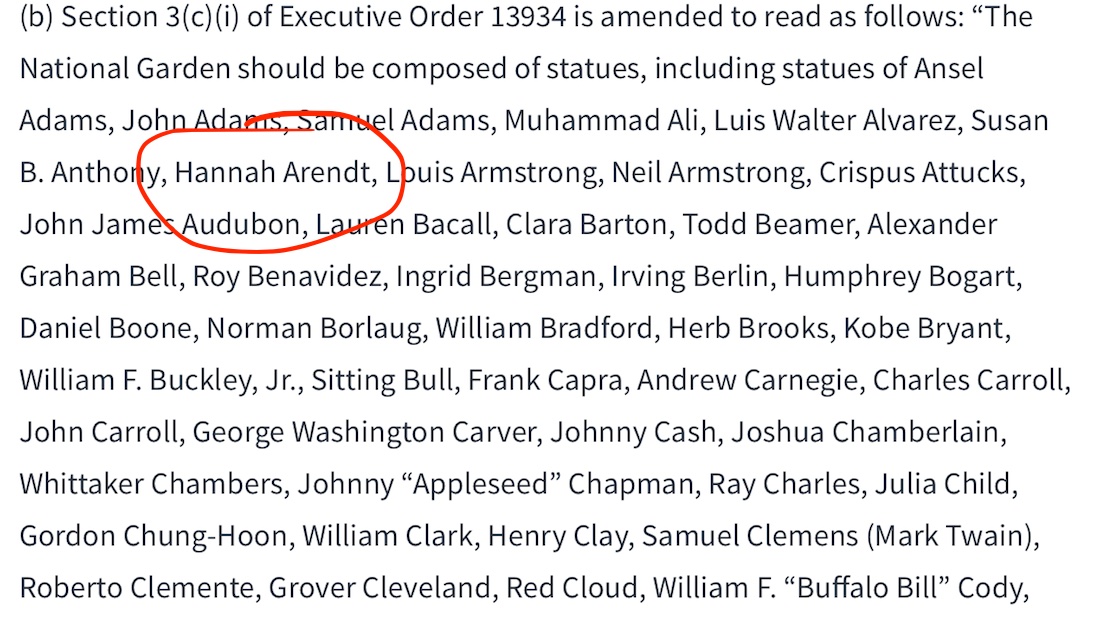First let me say that the irony of this order is beyond laughable. After Hannah Arendt escaped Nazi Europe, she emigrated to New York in 1941. She was a housekeeper, a journalist, & an adjunct professor before she wrote her first major work The Origins of Totalitarianism in 1951.
Origins is about the emergence of totalitarianism in the 20th century. Looking to the history of antisemitism, colonialism, capitalism, imperialism, fascism, authoritarianism, and tyranny she argues that all totalitarian movements are rooted in organized loneliness.
Organized loneliness is the mass experience of loneliness felt by a society when people are radically cut off and isolated from one another. It's achieved through the dissemination of political propaganda which distorts a person's ability to tell what's real from what's not real.
Once you've made it impossible for people to distinguish between right and wrong and destroyed their sense of reality through consistent lying you can do anything you want with them--And this is precisely what Donald Trump has done from day 1 of his political career.
Hannah Arendt argues that because organized loneliness destroys our ability to form meaningful connections with others it makes acting in concert impossible. In other words, organized loneliness destroys our ability to bring something new into the world.
And this is precisely how ironic Trump's decree is--Because we erect monuments and statues (ideally, I hope) to those who have done great deeds. Origins was about the destruction of freedom and the ability to act, but Hannah Arendt's The Human Condition is about new beginnings.
In The Human Condition, Hannah Arendt argues that everyone has a right to be remembered and that people are remembered for great deeds. We distinguish ourselves through speech and action. It is a certain striving for immortality that guides great men and women.
We record the great deeds (and awful ones) in poems, in stories, in statues and we remember them. And like Penelope weaving her web night after night, we too must constantly tell our stories to keep the fabric of memory alive. But, Hannah Arendt was worried.
Hannah Arendt was worried that freedom was being lost. She was worried that people no longer strived for immortality--to achieve great acts. Instead, she argued that people had fixed their gaze upon eternity, and only wanted to extend their life instead.
This combined with the rise of organized loneliness and the loss of the commons in modernity made it difficult for people to act. Hannah Arendt was not hopeful that we could recover freedom in our contemporary era.
She argued that these losses combined with a loss of tradition and authority gave way to the rise of the social. For Hannah Arendt, the rise of the social led to a loss of common sense, and a loss of a commonly shared world.
And meaning becomes impossible when there is no shared experience of the world. Remembrance becomes impossible when there is no public space for recognition. In a world where everything has been swallowed up by the social realm, there is no room left for much else.
It is an impoverished, cynical world that is mediated through television, computer and telephone screens. And Donald Trump is the apex of The Social. Perhaps the one true thing he said in office was that he wouldn't have been elected without Twitter.
There is no question that Twitter itself will become a monument someday, it already is. And what a monument it will be to this time we are living through. A record of the best and worst of humanity, of noble truths, and big lies, and small hearted men, and lonely souls.
I'm going to end with a quote from Hannah Arendt's The Human Condition: "In order to become worldly things, that is, deeds and facts and events and patterns of thoughts or ideas, they must first be seen, heard, and remembered and then transformed, reified as it were--
into things--into sayings of poetry, the written page or the printed book, into paintings or sculpture, into all sorts of records, documents, and monuments. The whole factual world of human affairs depends for its reality and its continued existence, first...
first upon the presence of others who have seen and heard and will remember, and, second, on the transformation of the intangible into the tangibility of things. Without remembrance and without the reification which remembrance needs for its own fulfillment and which makes it...
indeed, as the Greeks held, the mother of all arts, the living activities of action, speech, and thought would lose their reality at the end of each process and disappear as though they had never been."

